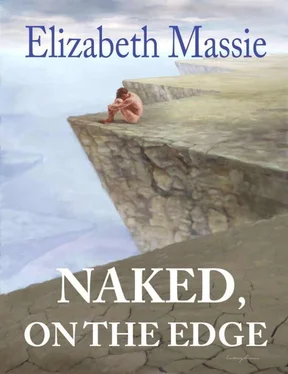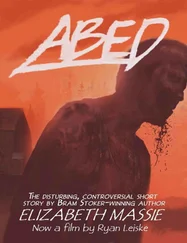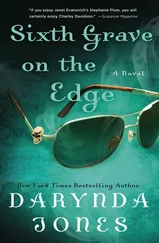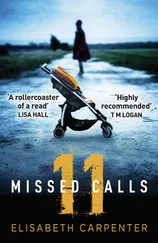Fisherman Joe cried, coughed, and shook his head. Melinda glanced at the man’s ax on the ground, at the dried blood and the black hairs stuck in it.
Katie’s hair is red , she thought.
“Sliced her good and left her to die on the creek bank,” said Bill. “You know, I’m trained to heal people, but I bet I can’t heal Katie. You think I can, Joe?”
Fisherman Joe’s head wavered, his eyes rolled in the sockets.
“I’ll give you what Katie got. A little pain before you must be going.” Bill took the pistol from his jacket pocket, and aimed at the man’s foot. He pulled the trigger. Joe’s shoe exploded with red. The man howled around his ruined tongue. Then Bill shot the man’s other foot. Joe slumped, no longer able to keep his weight up.
“Get it over,” said Melinda.
I love you guys,” said Bill, looking over his shoulder. His face softened for a moment. “Kill him,” said Melinda.
Bill shot Joe’s knees out, then put bullets through both of the man’s palms.
“He looks too much like Christ that way,” Bill said. He shook his head. “Can’t have that. This man is no Christ.” He picked up the ax, lifted it, testing the weight. “Nice tool. Sharp and heavy.” He walked to the tree and with a grunt, swung the ax at Joe’s heaving chest. It smacked deep into the flesh and bone. Josh groaned and turned away.
“No more Christ,” said Bill.
“No more Fisherman Joe,” said Melinda. Bill looked up at the man’s face. He was indeed, dead. His mouth hung open. His eyes were glazed globes.
“Hmmm,” said Bill. “And I had some other ideas.” Beside Melinda, it was Josh’s turn to lose control. He doubled up and barfed bile into the leaves.
Bill took the ax to the campfire and dropped it in the center of the flame. He collected the three pistols, wiped them off, and put them back into the van. “We were never here,” he said to Melinda and Josh. “Get the tents, put them away. Douse the fire, stir it up. I’ll take the Toyota, you two the van. We found Katie’s body in the ghetto. You understand me? Then the justice system can begin its tailspin.”
The tents went into the van, all traces of camping packed and swept away. Fisherman Joe remained tied to the tree.
“If he can feed the buzzards,” said Bill, “then his life wasn’t a total waste.”
“Now,” said Bill as he closed the hatch of the van. “Let’s get Katie.”
As the three walked through the dogwoods and down the knoll to the stream, Bill caught both Melinda and Josh’s hands and gave them a squeeze. “Thank you. Greater love has no man than he who will help take a life for a friend.” He was nearly giddy in his torment.
Josh and Bill gently lifted the butchered body from beside the jam of logs and leaves. One shoe fell from the dead woman’s foot into the water. As Bill and Josh carried Katie up the bank toward the van, Melinda followed alongside the creek to catch the shoe and take it back with them. No evidence could be left. Melinda grabbed a stick from the bank and tried to reach the shoe but it floated on, just out of reach.
The creek made a sharp turn around the rock shelf on the other side. Melinda, holding branches so not to fall in, went around the turn, watching the shoe.
She stopped.
She dropped the stick she was holding.
From somewhere behind, up at the campsite, she heard Josh call, “Melinda! We have to get out of here! Hurry up!”
Katie’s shoe was snagged on a small creek rock within reach. Several yards beyond the shoe, lying on the creek’s bank with its head split open was a black bear. Melinda took several steps closer. Her lungs were caught on the spikes of her ribs.
The bear’s paws were splayed out, one on the ground, one across its chest. The ax-sharp claws were clotted with blood. A hank of red hair was tangled in one set of claws.
Katie’s hair.
Melinda stepped into the stream and picked up the shoe. She hurried back to the campsite, where the van and car were turned around, engines revving.
As she climbed into front seat she was careful not to glance into the back where Katie lay wrapped in a tarp. But she did look at Fisherman Joe on the tree, mouth open and still, his expression one of terror and righteousness.
I never seen her!
“Let’s go,” Melinda said to Bill.
I never killed her, I killed….
She leaned against the door and closed her eyes. The van hit the road and sped toward the city.
What Happened When Mosby Paulson Had Her Painting Reproduced on the Cover of the Phone Book
Mail was in.
Elliott Mitchell stepped out onto the front stoop, pleased and shocked, as he usually was, at the cool roughness of the concrete beneath his bare feet. From the mailbox he pulled assorted flyers and bills, several final notices, and two copies of the new phone book, wrapped in brown paper. Elliott flipped through the collection, taking mental notes of the exciting variety of places from where the mail had come and filing this information away in the hungry places of his mind.
Washington, D.C. Chicago, Illinois. Pueblo, Colorado.
If there had been an atlas in his home like there had been in school, he would have looked them up. But the names themselves were intriguing enough.
He moved back into the house. His feet found the familiar, sticky warmth of the worn living room carpet. The cats peed here, and food from Elliott’s mother’s tray were spilled here. Elliott couldn’t keep up with it all anymore, and so the cats continued to pee and his mother’s trembling hands continued to knock portions of her dinners onto her lap and onto the floor.
Elliott dropped the stack of mail onto the top of the console television. He moved into the small kitchen. The windows were closed and locked in defiance of the cool May air. Orange flowered curtains hung, dead weights against grease-iced window glass.
There was a two-liter Dr. Pepper in the refrigerator.
Elliott took a long swing from the bottle. “Ellie?”
Elliott’s stomach fluttered. He turned toward the call. A drip of cola caught in the corner of his mouth then slid to his chin. “What, Mom?”
“Can’t hear my set. Come turn it up, honey.”
Elliott put the drink back and closed the refrigerator door. On the door, held by an eclectic collection of magnets, were some of Elliott’s best school papers from seventh grade. A spelling test, “A+!” A letter written in social studies to George Washington, “96, Good job Elliott!” Numerous charcoal, pastel, and watercolor artworks, each praised in red ink on a Post-It Note by Mrs. Pugh, the middle school art teacher. He would have had Mrs. Pugh in eighth grade this year for advanced art if he had not been so sick.
But he was homebound now.
He was sick. He knew it, Mom knew it. So very, very sick.
“Just like me, Ellie,” his mother had said. “If you go to school today I might just be dead when you get home.”
And so homebound was the only answer.
“Ellie? The set, I can’t hear it and I can’t get up. My back’s doing it again.”
Elliott went down the short dark hall to his mother’s room. The door was open. Smells of stale cigarettes, medicated vaporizer, and illness hung around the doorway, a heavy, eye-stinging, invisible fog.
“Set, baby, fix it for me.”
He stepped into the bedroom. The floor here was bare linoleum. It was not the pleasant coolness of the front stoop; it was clammy on the skin of his soles. But it was familiar. It was never a shock.
Mom was on her back in her bed, three pillows against the wobbly headboard, one set of white fingers curled around the bedspread at her chest, one set around a cigarette. In the blue light of the television set the skin on her thin face seemed to jump and crawl. When she smiled, Elliott could see her bad teeth. There were three of the cats on the bed with her. Next to the bed was the wheelchair the health department had given her.
Читать дальше












